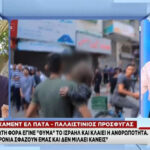The ERT journalist referred to the telefight between Bakoyannis and Doukas
The telephone battle between the mayoral candidates Kostas Bakoyannis and Haris Doukas held at the ERT Radio House in Agia Paraskevi was completely different from the ones we are used to among political leaders in previous years, the rules of which were defined by the Inter-Party Committee. As the journalist Giorgos Kouvaras who coordinated it tells APE-MBE, the model on which the Bakoyannis-Doukas telefight for the Municipality of of Athens was what was established a few months ago on ERT, before the national elections, in the show “At the Center the elections”, with invited candidates for parliament.
“It is a model that encourages direct dialogue between candidates, with rules that guarantee their equal treatment. Everyone who had taken part in these telefights told us that they had finally come to a show that became a real dialogue. So, we proposed this model to the two mayoral candidates. They accepted it and we jointly decided to give even more time for direct dialogue between them, allowing instead of 3 questions plus 3 interventions that we had originally proposed, to ask 3 questions and 5 interventions. To do this in the time frame we had, we reduced the number of clarifying questions that we journalists would ask from three to one. And I believe the result vindicated us”, emphasizes Mr. Kouvaras.
For the first time in a corresponding TV show, the protagonists were not the journalists but the politicians themselves, with the result that a civilized dialogue was held. ERT executives consider this to be a much more interesting model televised confrontationexpressing the hope that it will be implemented in the future both at the level of European elections and in national elections when they take place.
“I wish so but I do not hope so. Why do I wish it? Because I believe that such a process helps to express political positions briefly and comprehensibly, to show the differences, to make a confrontation of substance and not parallel monologues. Why don’t I hope so? Because I know the party staffs and I believe that they are usually a roadblock to any attempt at open, honest dialogue, which they consider “dangerous” because of its revelatory nature. I believe that the staffs are largely to blame, because they cultivate insecurity in the political leaders, believing that they are thereby enhancing their own role. I wish they would realize they are wrong. In any case, with the debate on ERT, a step has now been taken from which we neither can nor must go back”, emphasizes Giorgos Kouvaras to APE-MPE.
Similar models of tele-battles are implemented in many European countries in order to make the dialogue more direct and for citizens to form a better opinion about the positions of the candidates. ERT executives argue that the protagonists in the final stage before an election battle are not the journalists but the politicians themselves whom the journalists should encourage to confront each other directly by setting the terms of this confrontation.
“I will start from our own role, as journalists, which I believe becomes much more essential with this debate model. Our job is to be the medium for informing public opinion, that’s what media means after all. Therefore, what should mainly concern us is to enable positions, opinions, differences, weaknesses, oppositions to emerge. We are not the news, we are the medium for its transmission. I consider this essential if we want to be real protagonists in information and I always try to apply it in the four-on-four interviews and in the panels and of course in the debates. So, having clarified how I see our own role, I will tell you that citizens can also get closer to politics, if information plays its role correctly. From here on, it is a matter of the politicians themselves whether they will bring them even closer or distance them, as has happened in many cases”, emphasizes the presenter of the central report of ERT.
Finally, Giorgos Kouvaras refers to the future telefights: “If there is something else we haven’t thought of, we are always open to new ideas. Let them invite us to the inter-party next time to discuss them, before they themselves set the known strict framework. In my opinion, the information must be serious but not serious, if it wants to be attractive to the citizens” he points out and adds: “And this is what I try to do over time in all the media I have worked for”.




